The Egg and I (1947) Starring Claudette Colbert, Fred
MacMurray, Marjorie Main, Louise Allbritton, Percy Kilbride, Richard Long.
Directed by Chester Erskine. Screenplay by Chester Erskine, Fred F. Finklehoffe.
Based on the novel The Egg and I by Betty MacDonald (Philadelphia, 1945).
Producers: Chester Erskine, Fred F. Finklehoffe. Run time: 108 min. Black and
White. USA. Comedy
A businessman decides to quit the 9-to-5 rat race and buys a farm. Only then does he tell his wife about the move. If it sounds like the setup of Green Acres, you’re not wrong, but it is also the setup for The Egg and I, based on the book by the same name by Betty MacDonald, about her adventures and travels as a young wife on a chicken farm on the Olympic Peninsula in the US state of Washington. A little change was made to make the husband a World War II veteran in the film.
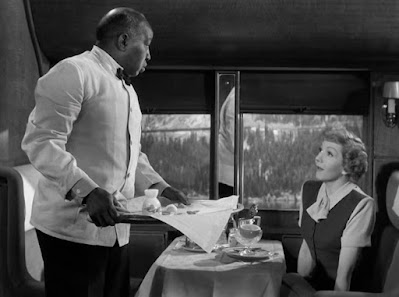 |
| There is more to an egg than Porter (Jesse Graves) realizes and Betty (Claudette Colbert) educates him. |
The film opens with a brief prologue in which "Betty," who is in a train dining car, explains to an unappreciative waiter, who has just dropped and broken an egg, the work that went into producing it.
While shaving one morning, World War II veteran Bob (Fred
MacMurray) informs his new bride Betty (Claudette Colbert) that he has quit his
mundane office job in the city for the idyllic life of raising chickens in the
country, something he had been thinking about while trapped in a foxhole in
Okinawa.
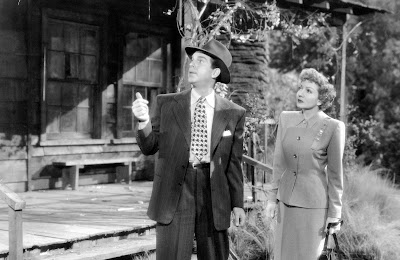 |
| Bob (Fred MacMurray) is more excited about their new home than Betty appears to be. |
Soon afterward, the two are driving a decrepit truck crammed with livestock, into the mountains before arriving at their new home, a dilapidated old shack. But Bob is enthusiastic about the wonderful new life he sees them having there, even though on their first night they discover the roof leaks.
Bob doesn’t let that bother him as he plots out a timetable
for the farm, from breeding livestock over the next year to the birth of the
couple's first baby.
Bob is up before sunrise making breakfast, anxious to get going on the repairs. They start by fixing up the house and while Bob is out buying supplies for building the chicken coop, and Betty is planting her garden, they are visited by Pa Kettle (Percy Kilbride), who invites them to call if they need something but instead promptly borrows some of the wood and nails that Bob has just purchased for their projects.
 |
| Tom Kettle (Richard Long) watches as Betty overreacts to seeing Indians in her yard. |
Later that afternoon, Betty is terrified when she looks up from her stove and sees two Indians peering through her kitchen window. Geoduck (John Berkes) and Crowbar (Vic Potel) are there to sell fish. Bob buys a dozen crabs from them.
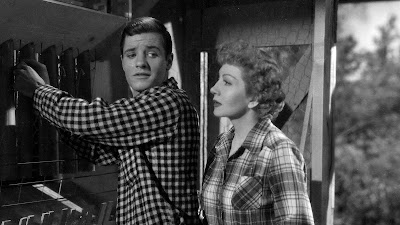 |
| Betty learns that Tom wants to go to college to study Engineering. |
Helping Bob is the Kettle’s oldest son, Tom (Richard Long), whom Betty begins to realize is too smart not to go to college.
Bob asks Betty about her egg collection and Betty admits
that she hasn’t been doing it as regularly as she should.
Reluctant to deprive the chickens of their eggs, Betty
decides instead to lead Cleopatra the pig into her pen. Just as Cleopatra
pitches Betty into the mud, Harriet Putnam (Louise Allbritton), the glamorous divorcee
who owns the neighboring Bella Vista Farm, arrives and effortlessly coaxes the
pig back into her pen.
On her way into the house to change, Betty is confronted by Billy
Reed (Billy House), a persistent, never-take-no-for-an-answer traveling salesman
who unsuccessfully pesters her to buy his wares.
Betty decides to visit Tom's family to plead for him to go
to college. As Betty saunters down the road to the Kettle farm, she is offered
a ride by Mrs. Hicks (Esther Dale) and her eccentric mother (Isabel O'Madigan).
Mrs. Hicks tactlessly predicts the failure of the newlyweds' farm. Betty does
learn that the county is full of Hicks and that her mother enjoys worrying
about her health even though she is not ill at all.
 |
| On her first visit, Betty helps Ma Kettle (Marjorie Main) feed her brood. |
At the Kettles', Betty is greeted by a boisterous brood of children and livestock. When Betty relates Tom's dream of going to college, the big-hearted, but slovenly Ma Kettle (Marjorie Main) replies that the entire family is dependent upon his earnings and can’t spare him.
 |
| Betty is jealous of Harriett (Louise Allbritton) and fakes a headache during a tour of her farm. |
At Harriet's invitation, Bob and Betty visit her luxurious Bella Vista Farm, where Betty becomes jealous when Harriet begins to flirt with her husband. She fakes a headache so they have to leave.
To rekindle Bob's ardor, Betty dons her wedding dress and in
response, Bob, who spies her in the gown, dresses in his tails. After dinner,
the couple dances and are interrupted by Mr. Henty (Donald MacBride), a
taciturn egg buyer, who appears in their living room. He has come at the urging
of Harriett to see if he wants to do business with them. Unimpressed by their
finery, and in fact, turned off by it, Henty leaves without agreeing to buy any
eggs.
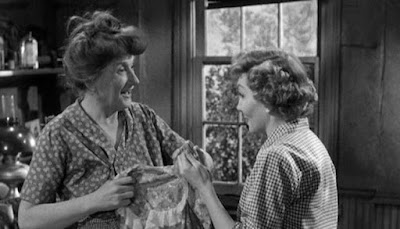 |
| Betty makes a dress for Ma Kettle to wear at the dance. |
When Betty makes Ma a new dress for the big dance that night, Ma gives her a quilt she has just finished sewing.
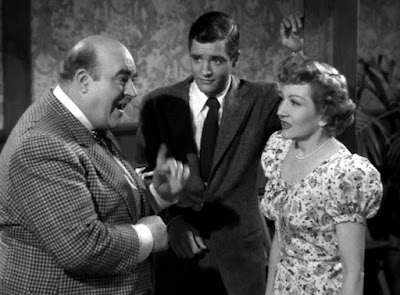 |
| At the dance, Betty is forced to dance with a string of idiosyncratic partners, including Billy Reed (Billy House), a traveling salesman. |
On the night of the party, Betty ends up dancing with a string of idiosyncratic partners while Harriet monopolizes Bob, thus infuriating Betty. She feels so jealous that she throws one of her shoes at the couple, hoping to hit Harriett, but she instead hits Bob.
The party comes to an abrupt end when the sheriff announces that the Kettles' barn has caught fire from his still and the flames are spreading throughout the valley. Bob and Betty struggle to save their farm, but when the wind shifts, the blaze destroys their outbuildings and crops. The only thing that will save them is rain and even though no one thinks it will, it does rain.
 |
| After the fire, the neighbors, even Ma and Pa (Percy Kilbride) Kettle, offer help. |
The next morning, Bob talks about giving up but Betty wants to rebuild. They are surprised when their neighbors rally to help them rebuild the farm and Henty offers them a two-year egg contract.
To earn the money for Tom's tuition, Betty decides to enter
Ma's quilt in the county fair. Upon learning that all the judges are cousins of
the Hicks and consequently award prizes only to members of their family, Betty
bribes Billy Reed, who is in charge of the fair, promising to buy from him in
exchange for him giving the quilting prize to Ma.
 |
| While Betty is busy having fun with Ma, Harriett lures Bob away from the fair. |
As Betty and Ma enjoy the rides at the fair, Harriet lures Bob to her farm by offering to sell him the property.
After Ma's quilt is awarded first prize, Betty goes to give
the check to Tom, but she faints. When she comes to, Ma declares that she must
be pregnant.
That night, Betty prepares a celebratory dinner, but Bob is
a no-show. While she’s waiting, Emily (Ida Moore), an old lady, comes to the
door, introduces Betty to her invisible husband, and regales her with stories
about vicious giant chickens. Soon after, the sheriff (Samuel S. Hinds) comes
to claim Emily. He explains that Emily used to live at the farm before going
insane after her husband ran off with another woman.
Late that night, a messenger delivers a note from Bob,
notifying Betty that he has been delayed. In a jealous rage, Betty packs her
suitcases and returns to the city to live with her mother, stopping only long
enough to paint “I’m Through!” on the kitchen wall.
Over the months, Betty refuses to open the outpouring of
letters that Bob has mailed her. But after giving birth to a baby girl, she
decides to reconcile with him and boards a train headed for the country. At the
station, Betty hails a cab and instructs the driver (Fuzzy Knight) to take her
to Bob's house. When the driver stops at Bella Vista Farm, Betty is furious.
She demands that he take her back to the station and then changes her mind and
he takes her back to the Bella Vista Farm.
There, she angrily confronts Bob until she discovers that
Bob is not living with Harriett but is the owner of the farm. After Bob informs Betty that he was delayed
the night of the fair because he was busy cajoling Harriet into selling him the
farm, they embrace and Betty produces their daughter, reminding him that they
are right on schedule.
Bob then dashes off to resolve another crisis at the chicken
house.
Shot between October 1946 and January 1947, with a budget of
$1.9 million, the film had its premiere in Los Angeles on March 21, 1947, and
would go on to make $5.5 million in the U.S. and Canada during its initial run.
The film would be the sixth of seven screen pairings of Claudette Colbert and Fred MacMurray, dating back to
Grand Old Girl (1935). They would appear in one more film together, Family
Honeymoon (1949). But the screen couple that would grab the most attention
in The Egg and I was instead Marjorie Main and Percy Kilbride, Ma and Pa
Kettle. The characters, created by Betty MacDonald in her book, would go on to
appear in a series of nine films from Ma and Pa Kettle (1949) to The
Kettles on Old MacDonald's Farm (1957), though by then Kilbride had been
replaced by Parker Fennelly as Pa.
Reviews that I’ve found from the time of the film’s release
have not been all that positive, mostly when the film’s story and execution are
compared with the original book. Bosley Crowther opened his review in The
New York Times with this warning, “Readers of Betty MacDonald's hen-house
diary, "The Egg and I," which told of her lusty experiences as a
chicken farmer's wife, had better forego the expectation of finding any of the
original's earthy tang in the so-called movie version…” Variety’s review
likewise unfavorably compares the film to the book, ” Shortcoming is in an
evenness of treatment – partially in the writing but more importantly in
Erskine’s direction – that fails to suck the drama out of the situations
presented in the book.”
Book-to-film comparisons are nothing new and it is quite
unusual for the film to get better reviews than the source material. However,
having not read the book, I am not weighed down by my opinions of Mrs.
MacDonald’s tome. I agree that the film didn’t take full advantage of the
forest fire that threatened the farm but it is being played as a comedy and
some of the destructiveness of the fire is mitigated by the sudden rain which
saves the farm from total destruction. I would agree that there had to be meat
left on the bone from the book that didn’t make it to the screen. The
separation and the birth of their baby get minimal screen treatment but,
again, I think the idea was to play it for laughs as much as possible.
While I generally like Claudette Colbert and Fred MacMurray,
they are both a little too old to be believable as a couple just starting out
after his service in the war. She was 43
when the film was made and he was 38. Once you get past that, they seemed to do
well with the parts. While I agree with Variety’s assessment that “Claudette
Colbert is appealing but not entirely believable as the city gal who accepts so
willingly out of wifely love the rugged life…,” I disagree with what is
supposed to be a swipe at her co-star, “MacMurray runs through his role in his
routine, superficial fashion…”
MacMurray, unfortunately, plays a role that seems very
dated. The days of husbands running roughshod over their wife’s life like that
are over and as such, Bob comes off as a bit of a dolt. He never seems to
listen to Betty or take her into consideration throughout the film. The acting itself seems to be in line with what I best know him from, which was the long-running
My Three Sons. He’s obviously playing it for laughs and is not trying to
explore any real depth in the character.
It is interesting that Ma and Pa Kettle would catch on so much
after this film. Marjorie Main is very enjoyable as the woman who has given up
trying to manage an out-of-control household led by a husband who is lazy to
say the least. Based on his critique, that the Kettles “and
the other rural characters which have been rung in are used for nothing more
original than old-time bumpkin burlesque,” Crowther would be surprised that
they would be given their own series of films. Main, despite his opinion, was
nominated for Best Supporting Actress for her portrayal.
The film, overall, is enjoyable. There are some really good laughs and the acting is pretty solid. I’m not sure what more contemporary reviewers were looking for in the direction but the story seems to work for the most part. I have my own complaints about casting and the motivation of the characters but once you get past that, there are enough laughs to recommend the film.

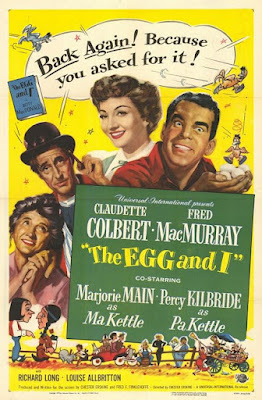
No comments:
Post a Comment